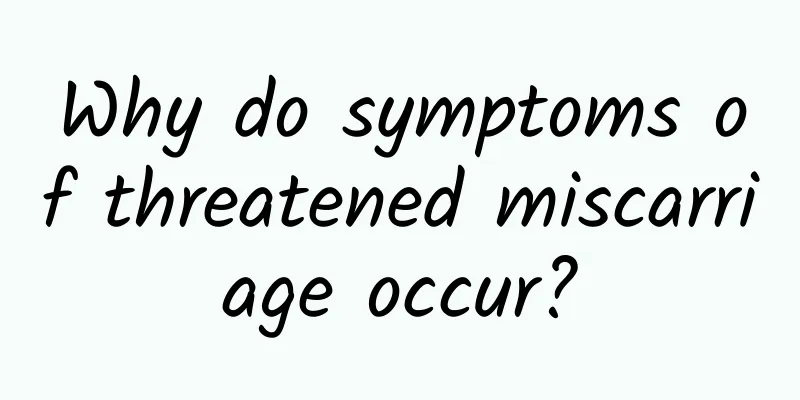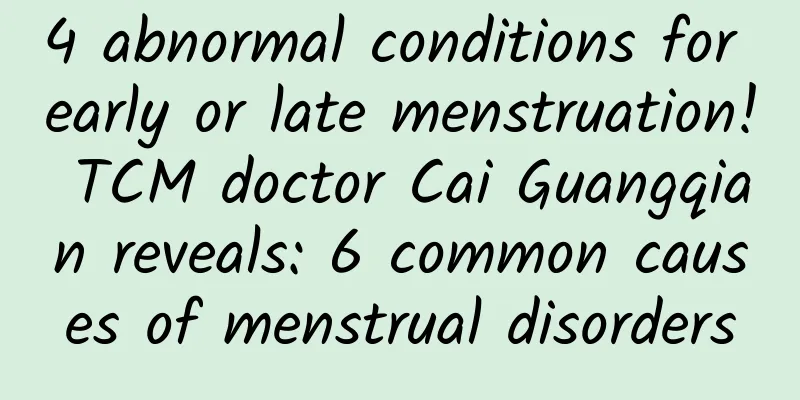Why do symptoms of threatened miscarriage occur?

|
The symptoms of threatened abortion may be related to genetics, environmental factors, one's own physiological conditions and certain underlying diseases. It is necessary to seek medical attention in time to clarify the cause and carry out targeted treatment. Common causes include abnormal embryo development, maternal hormone imbalance, and bad living habits. 1. Genetic factors: Fetal chromosomal abnormalities are one of the most common causes of threatened miscarriage, accounting for about 50%-60%. If the embryo has serious abnormalities in chromosome structure or number during early development, it will not be able to maintain normal development. These abnormalities may come from the genetic information transmitted by the parents, or they may be mutations in the sperm or egg when they combine. If there are multiple signs of miscarriage in early pregnancy, you should consult a genetics expert for a comprehensive chromosome test. 2. Environmental factors: Adverse external conditions can increase the risk of miscarriage, such as long-term exposure to toxic chemicals, heavy metals or radioactive radiation; severe air pollution; or even long-term exposure to secondhand smoke. If a pregnant woman is in a stressful living environment, it is recommended to avoid harmful exposure in a timely manner, maintain a good living environment, and receive guidance from a doctor. 3. Physiological factors: Maternal hormone imbalance, such as insufficient progesterone secretion, can affect the implantation and development of the embryo; uterine structural abnormalities such as uterine septum, double uterus, and intrauterine adhesions can prevent the embryo from developing smoothly; polycystic ovary syndrome and endometrial problems can also affect the health of the embryo in early pregnancy. These conditions need to be clearly diagnosed through ultrasound examinations, hormone testing, etc., and in severe cases, hormone replacement therapy or surgical intervention can be accepted. 4. Underlying diseases and infections: When the mother suffers from chronic hypertension, diabetes, thyroid dysfunction, lupus erythematosus and other diseases, it may cause placental dysfunction and bring risks to fetal development. Infection with certain pathogens during pregnancy, such as rubella virus, toxoplasmosis, and cytomegalovirus, can also easily induce threatened abortion. Screening for the source of infection through routine prenatal examinations and taking antibiotics or antiviral treatment early can reduce the risk. 5. Unhealthy lifestyle: Bad living habits such as long-term smoking, drinking, high caffeine intake, staying up late, and high-intensity strenuous exercise can reduce the success rate of embryo implantation and development. Adjusting a healthy lifestyle, such as regular work and rest, avoiding heavy physical labor, and a balanced diet, can help maintain a stable pregnancy. There may be many reasons for the symptoms of threatened abortion. After diagnosis, personalized intervention measures should be taken according to the specific situation. If you experience abdominal pain, vaginal bleeding and other symptoms in early pregnancy, you should immediately go to the obstetrics department of the hospital to determine the health of the fetus and the mother, and receive treatment or rest as prescribed by the doctor. Maintaining physical and mental health during pregnancy and regular prenatal check-ups are important guarantees for preventing complications, and health management before pregnancy should not be ignored. |
<<: What causes threatened miscarriage?
>>: Is it dangerous to get pregnant after 4 months of hydatidiform mole?
Recommend
What to eat to prevent cervicitis
Cervicitis is a common disease among women of chi...
What is the best way to eliminate uterine fibroids? The secret recipe to eliminate uterine fibroids
What is the best way to eliminate uterine fibroid...
Does irregular menstruation at 48 need to be regulated?
If the menstruation is irregular but there is no ...
What are the characteristics of serous ovarian cysts? Three characteristics should be understood
What are the characteristics of a serous ovarian ...
What are the causes of cervicitis?
Cervicitis is a common gynecological disease, whi...
How to diagnose cervical erosion?
How to diagnose cervical erosion? Many women know...
She is 41 and in better shape than when she was younger! Make sugar reduction a long-term eating habit, so you can lose weight healthily without getting fat again
I am 41 years old this year. Everyone wants to li...
Is biochemical abortion harmful to the body?
Biochemical pregnancy miscarriage refers to a spo...
Is it serious if I have ovulation bleeding during sex?
Ovulation bleeding is usually not a problem durin...
Lose weight easily with 5 good habits before going to bed
Many weight loss methods are closely related to s...
The secret of bride's slimming: drink Chinese herbal tea to get rid of fat
Getting married is a major event in life. When th...
What are the dietary considerations for threatened abortion?
Pregnancy itself requires you to pay attention to...
How is ovarian cyst classified clinically?
In life, ovarian cysts are a common gynecological...
What medicine should women take for irregular menstruation? 7 dietary taboos for women during menstruation
What medicine should women take for irregular men...
What to do if you have an ovarian cyst but are pregnant
What should I do if I have an ovarian cyst and I ...









